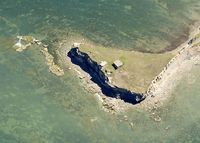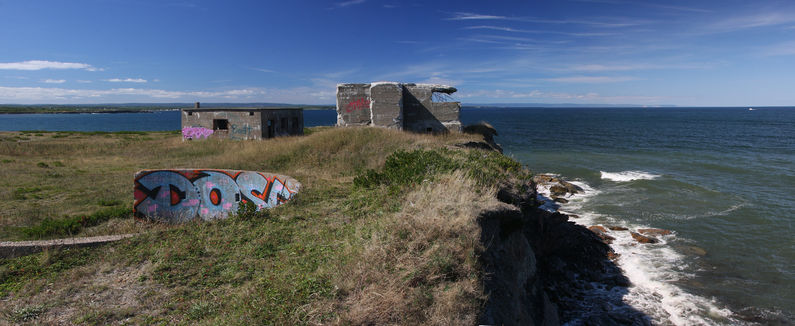Cranberry Head Battery
|
Cranberry Head Battery (1917-1948) - Cranberry Head Battery Battery was a coastal gun battery situated on a rocky cliff overlooking the entrance to Sydney Harbor, Cape Breton County, Nova Scotia, Canada. The site experienced two different periods of activity, World War I (1914-1917) and World War II (1940-1948). Last deactivated in 1948.
Cranberry Head Battery HistoryPart of the Harbor Defense of Sydney. World War I (1914-1918)When Sydney was selected as a convoy assembly port in June 1917, its defenses increased in importance. There was also agitation to have the defenses of Sydney harbour improved because of the importance and vulnerability of the steel plant and the coal mines. As a result, a number of coastal defense batteries were constructed in the harbour entrance and its approaches, including a battery at Cranberry Head consisting of two 4.7-inch quick-firing guns on concrete mounts, with a concrete magazine and a wooden battery commander's post. One 4.7-inch field gun was moved here from Chapel Point Battery in May 1917, with a third concrete mount built in August 1918. No incoming ship could approach beyond the line between Flat Point and Cranberry Head without first establishing its identity to a naval examination vessel. One of primary responsibilities of the coastal batteries at Cranberry Head (and Fort Petrie) was to be ready at all times to open fire, first with warning shots and then for effect, on instructions from the examination staff. World War II (1939-1945)During WWII a fire-control observation post and two searchlights were located here, located within the WWI battery site. These were Canadian General Electric sixty-inch, eight-hundred-million candlepower concentrated beam U.S.-type carbon-arc "Coastal Artillery Search-Lights" (C.A.S.L). In clear weather the concentrated beam C.A.S.L.s had a range of nine miles.
Current Status The site is undeveloped private property accessible by a footpath at the east end of Peck Street. The site contains the remains of the fire control station, a concrete barracks and a concrete gun emplacement (or possibly a searchlight shelter). All of the concrete structures are damaged and covered with graffiti. No period guns or mounts in place. Coastal erosion has caused the cliff face along parts of the access footpath, in front of the Observation/Fire Control Tower and Searchlight Emplacements to fall away. As of the summer of 2017 this has left the front of the Observation/Fire Control Tower undermined. Eventually the remains of the Observation/Fire Control Tower and the Searchlight Emplacements will fall into the sea.
Sources:
Links: Visited: 13 September 2014
|


